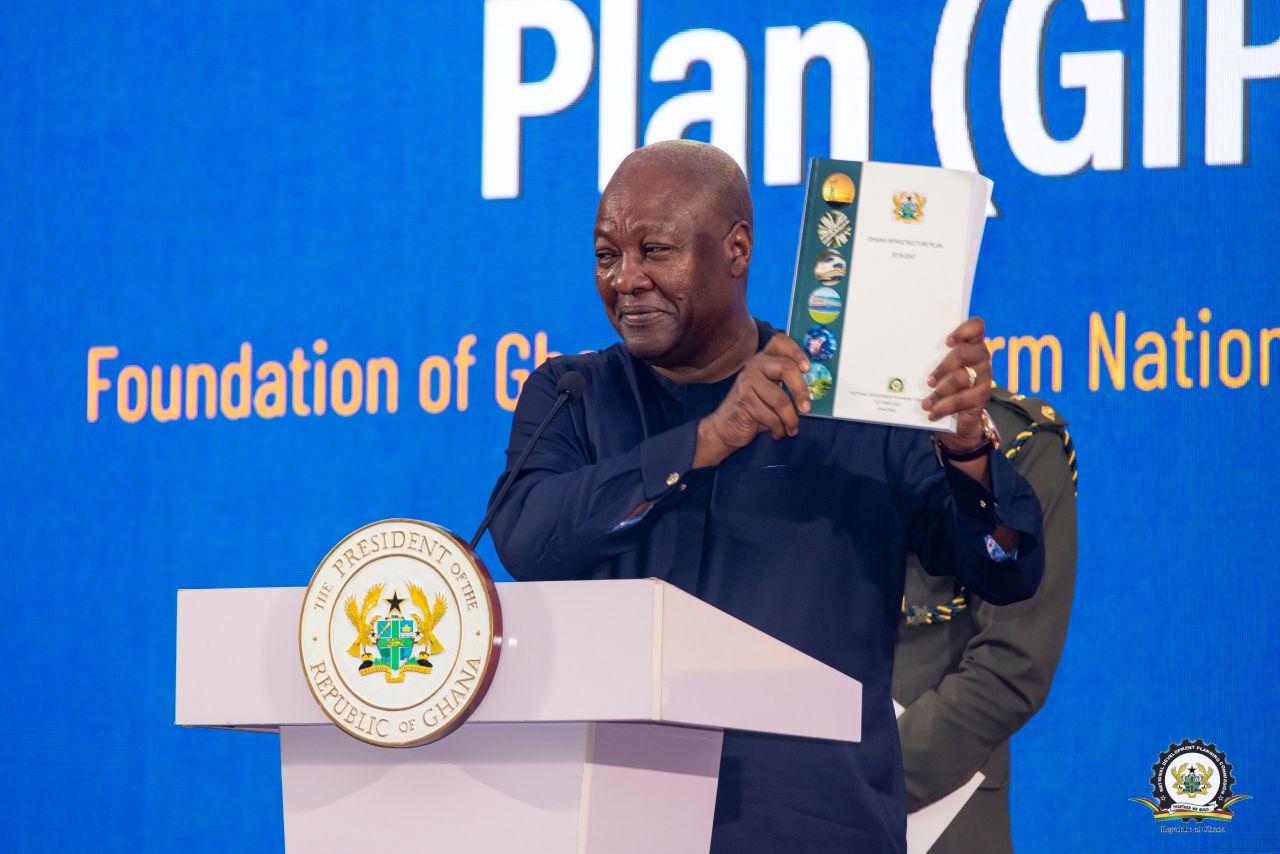National Development Planning Commission
National Development Planning Commission

The President of the Republic of Ghana, His Excellency John Dramani Mahama, called for an end to scattered and politically motivated projects, pressing home the need for long-term nationalistic plans that have the potential of delivering sustainable success to the country.
Delivering an address at the launch of the Ghana Infrastructure Plan on Wednesday, October 22, 2025.
President John Mahama stated that the government will ensure that its priority projects, including the Big Push Agenda, aligns with the tenets and objectives of the Ghana Infrastructure Plan (GIP), which was developed by the National Development Planning Commission.
He assured the public that the Big Push would be executed through deliberate and high-impact investments, in line with Article 35(7) of the 1992 Constitution, which mandates continuity of development programs across administrations.
He also pledged to revitalise the Ghana Infrastructure Investment Fund (GIIF) to finance commercially viable projects and strengthen institutional capacity for project preparation, monitoring, and evaluation.
Addressing the persistent geographical imbalance in economic development, President Mahama expressed disappointment with the discontinuation of the Savannah Accelerated Development Authority (SADA) and the ineffectiveness of its replacements.
He stressed the urgent need to rebalance development, particularly in northern Ghana, where young people face limited economic opportunities despite completing secondary education.
Underscoring the importance of governance, President Mahama argued that infrastructure must be depoliticised and guided by merit, transparency, and continuity. He warned that weak infrastructure governance costs countries billions, while robust systems drive growth. He also called on Parliament to enact enabling laws to safeguard the GIP’s vision and urged ministries, departments, and agencies to align their sector plans with the GIP.
He described the GIP as a national document requiring collective commitment across political divides, public institutions, civil society, and generations. “To build better, we must govern better,” he concluded, reaffirming the government’s dedication to a shared vision of progress.
Deputy Finance Minister, Hon. Thomas Ampem Nyarko (MP) described the Ghana Infrastructure Plan as a bold, long-term framework that aligns national priorities with limited resources and rising demographic pressures.
He emphasised its potential to generate strong fiscal multipliers, address infrastructure deficits, and attract blended financing through public-private partnerships (PPPs). Highlighting a GHS13.9billion allocation under the Big Push initiative, he pledged the Ministry’s commitment to co-leading implementation with NDPC and Parliament, ensuring continuity, efficiency, and sustainable investment across political transitions.
On his part, the Chairman of NDPC, Dr. Nii Moi Thompson, remarked that the launch of the GIP marks an important step towards the preparation of a holistic national plan that will provide a clear blueprint for the development of the country.
“The launching of the infrastructure plan today is the first step of the process towards preparing a composite long-term plan that would include a systematic review and incorporation of not just the 40-Year Development Plan, which was prepared by the NDC government, but also Ghana Beyond Aid, Ghana@100, and the Long-term National Development Perspective Framework, all of which were prepared by the NPP government.
“By the end of 2026, we expect to have a composite long-term plan to be known as Ghana Vision 2057: A Roadmap to Economic Transformation and Shared Prosperity. I know some of you are already wondering why we need a long-term development plan when we have failed in our most recent attempts to have one that is acceptable to all. Well, we need it, because without that we are not going anywhere. We may make some progress here and there, but it would likely fall below what we really need, and our development challenges would accumulate over time until they become a crisis and a threat to social stability and national security”, he said.
Citing the success stories of the United States of America, Dr. Thompson outlined the importance of a long-term plan to Ghana and intimated that some of the challenges that have plagued the country were due to the absence of a long-term plan.
“Every serious country has a long-term plan, even if we haven’t heard of it. The United States, for example, has one of the most dynamic labour markets and one of the lowest unemployment rates among its peers. This didn’t happen by accident. The US has a 100-year strategy for creating jobs, 1950 to 2050, backed by an Employment Act, research by the Council of Economic Advisors (NDPC’s rough equivalent), and the designation of “maximum employment” as the primary objective of monetary policy, followed by price stability and moderate long-term interest rates.
“We failed because of misunderstanding that a long-term plan has nothing to do with the present, that we should worry about today and let the future take care of itself. In fact, whatever we do today must be the reflection of the future, with all the opportunities it offers; only a strategic or long-term plan can help us maximise our chances of success, even in the short term,” he said.
In a welcome address, the Director-General of the National Development Planning Commission (NDPC), Dr. Audrey Smock Amoah, emphasised that the GIP forms the infrastructure arm of Ghana’s 40-year national development plan (2018–2057), crafted through an evidence-based, participatory process grounded in constitutional mandates and national consultations.
She highlighted the GIP’s integrated approach, spanning energy, transport, housing, ICT, and more together with its alignment with global frameworks like the SDGs and AU Agenda 2063.
She called for unified national effort across public institutions, private sector, academia, and civil society to ensure the GIP becomes a living framework for inclusive and sustainable transformation, underpinned by transparency, monitoring, and accountability.
#13 Switchback Road,
P. O. Box CT 633,
Cantonments, Accra - Ghana
Digital Address | GA-147-0671
Monday -Friday : 8am - 5pm
The National Development Planning Commission (NDPC) was established under Articles 86 and 87 of the 1992 Constitution as part of the Executive.